Memoir of John Shakespear Bartley, 1916-1919 - Part 15
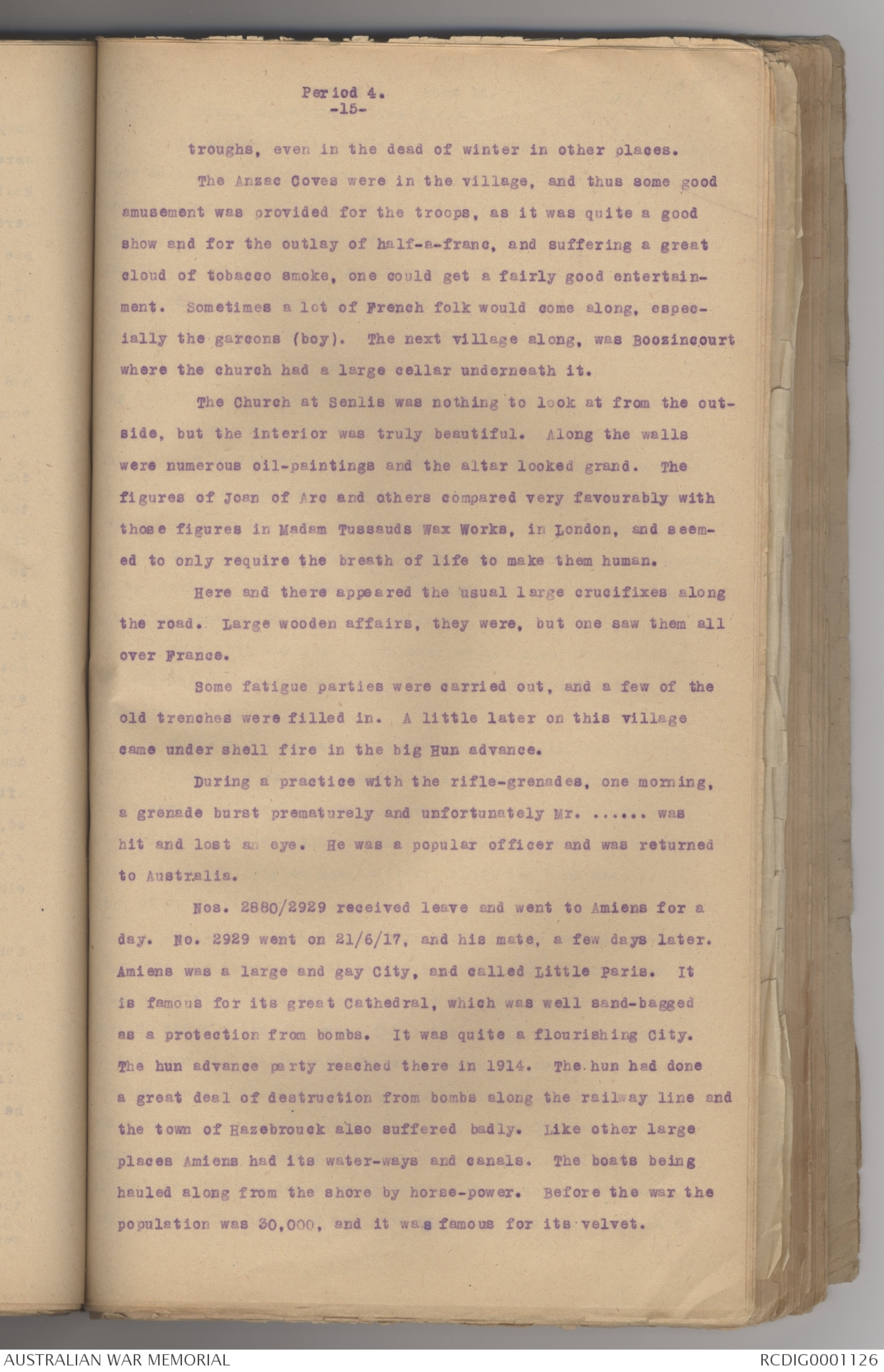
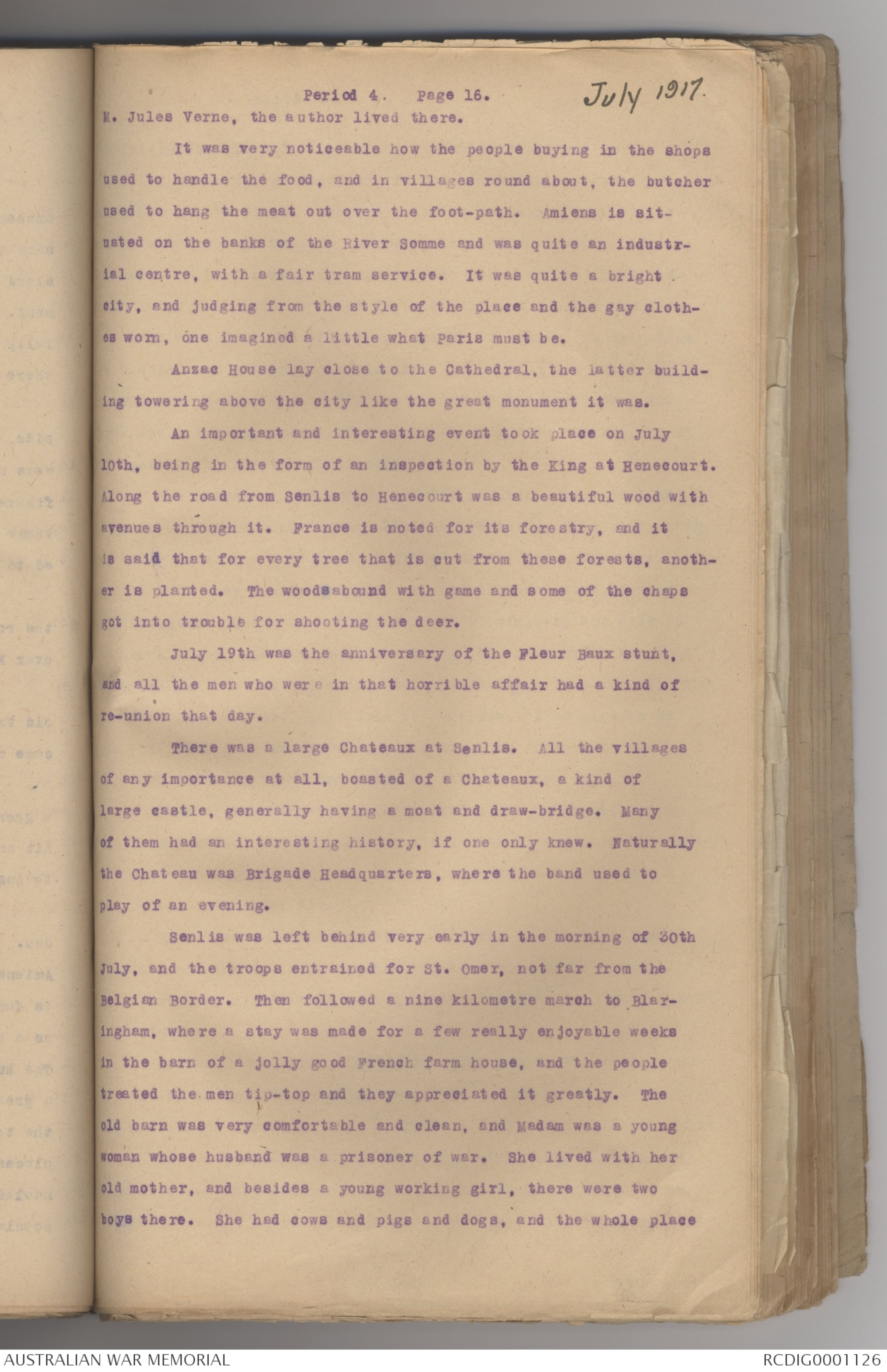
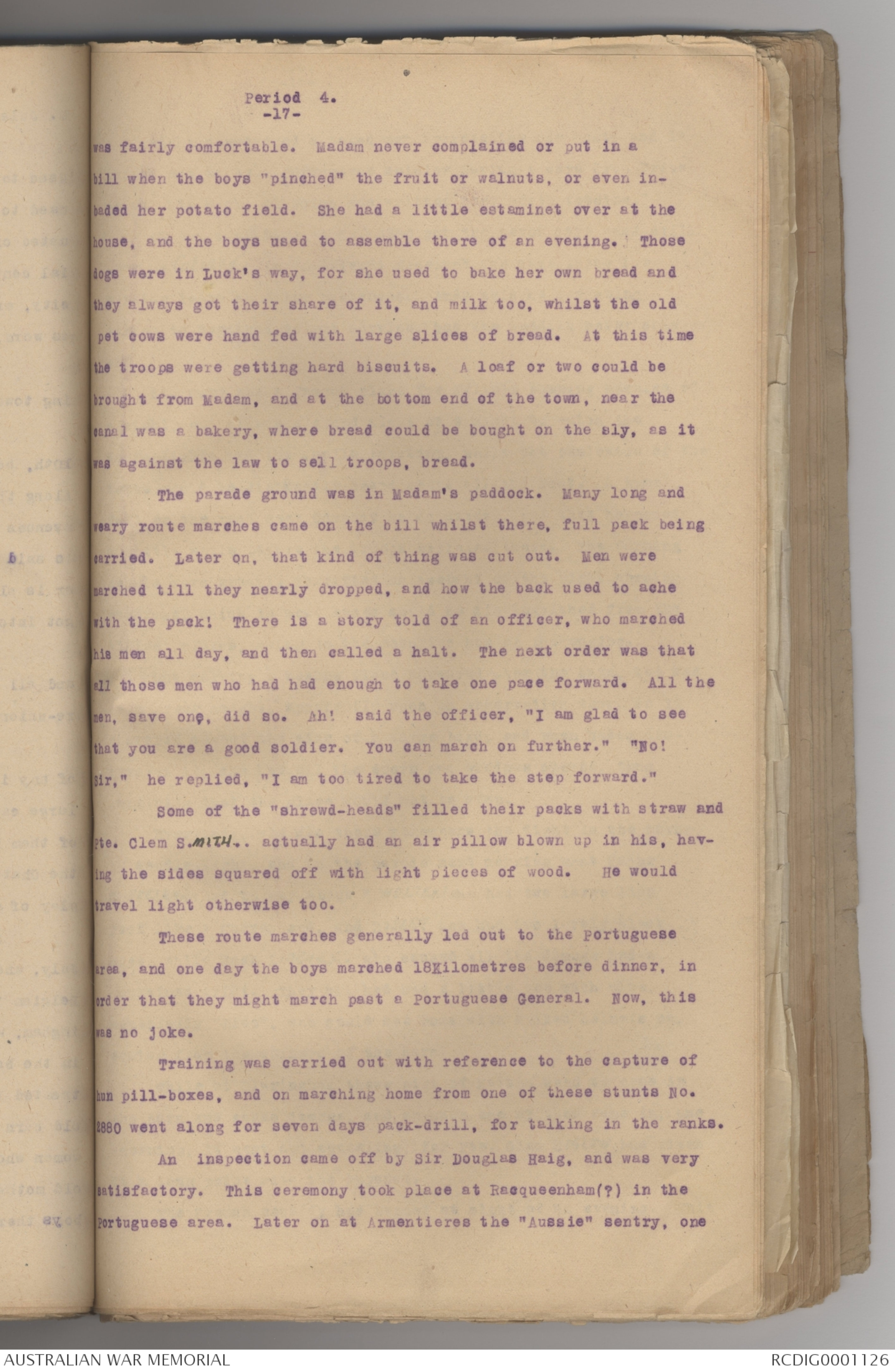
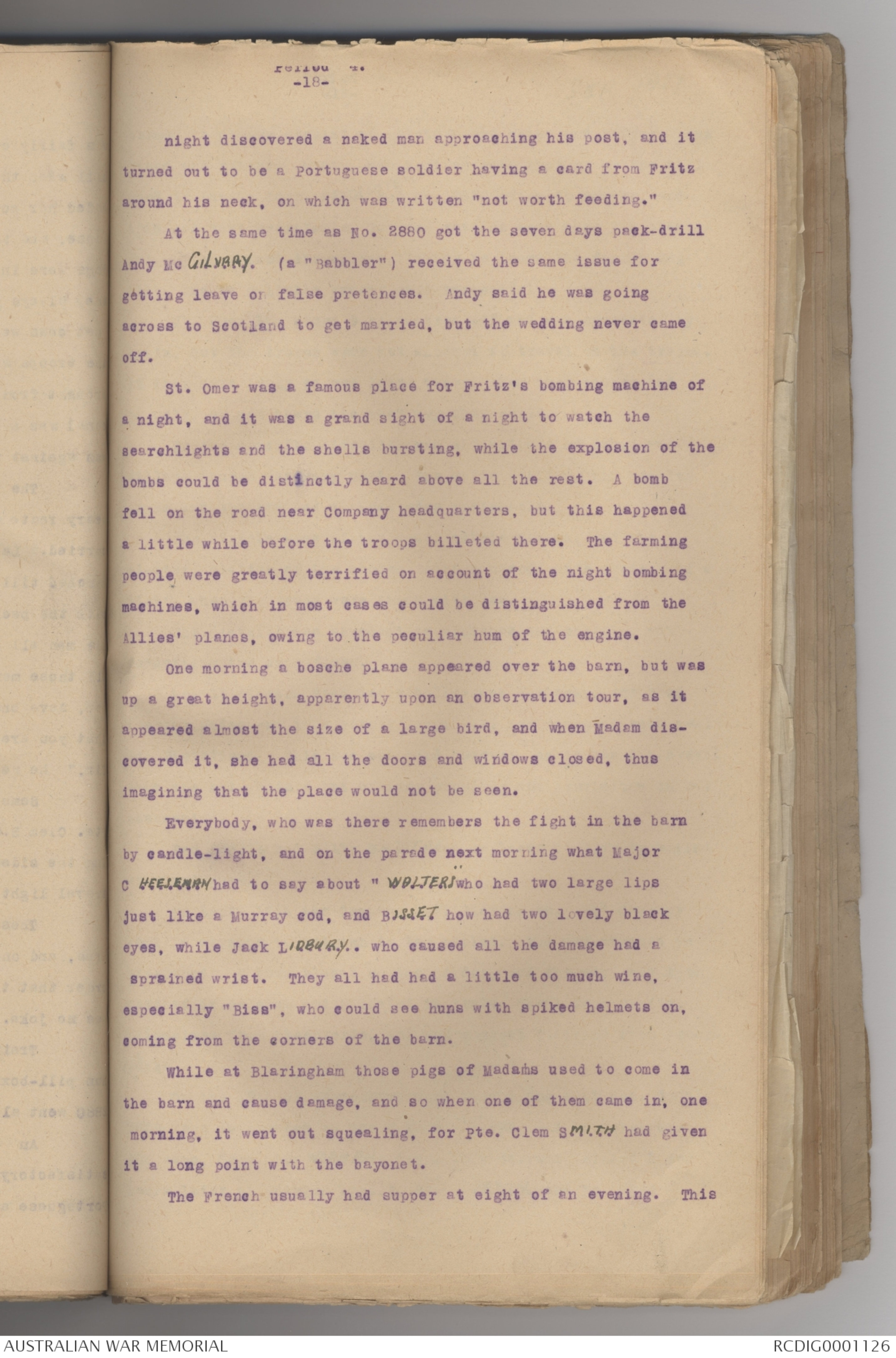
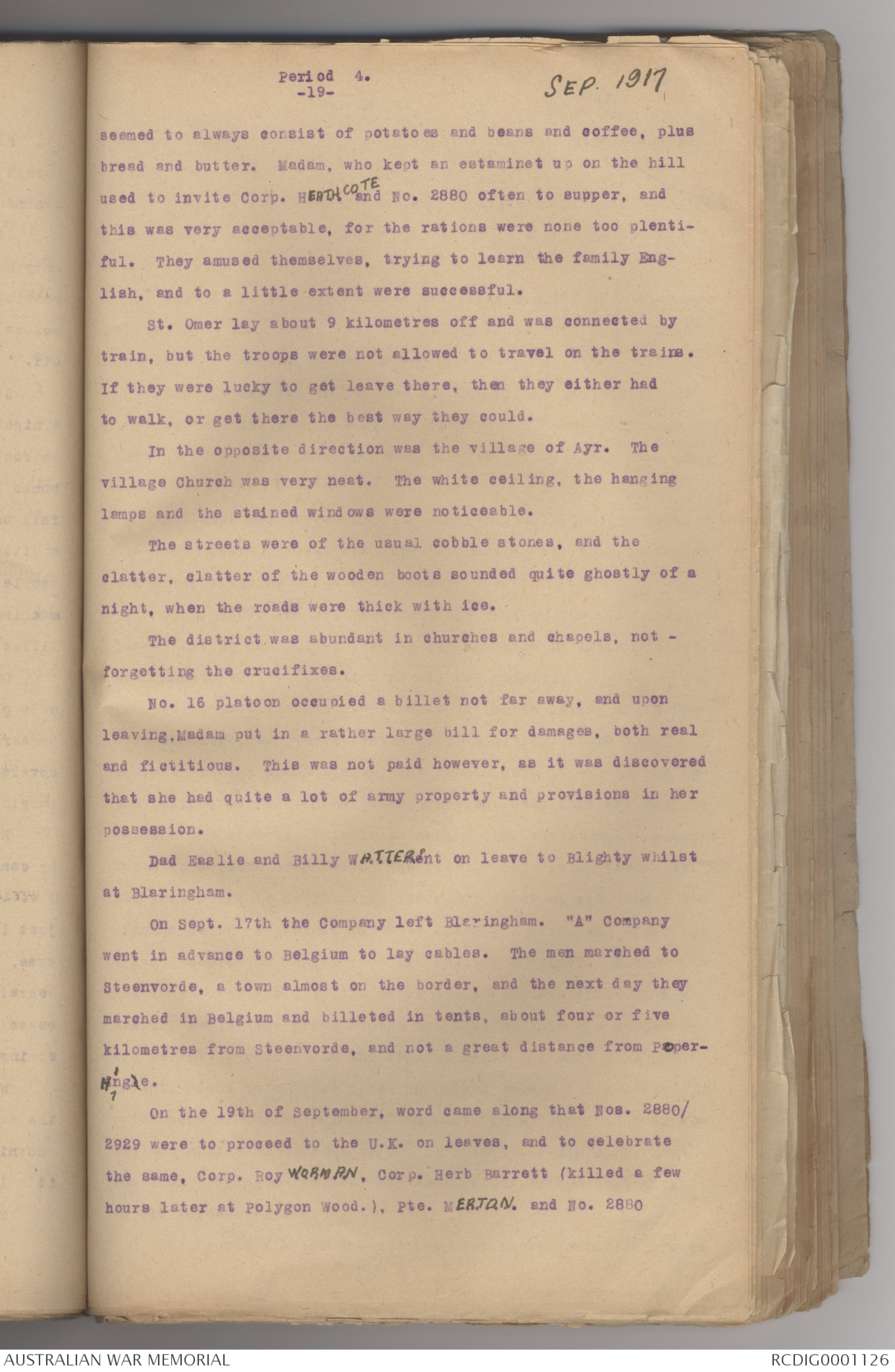
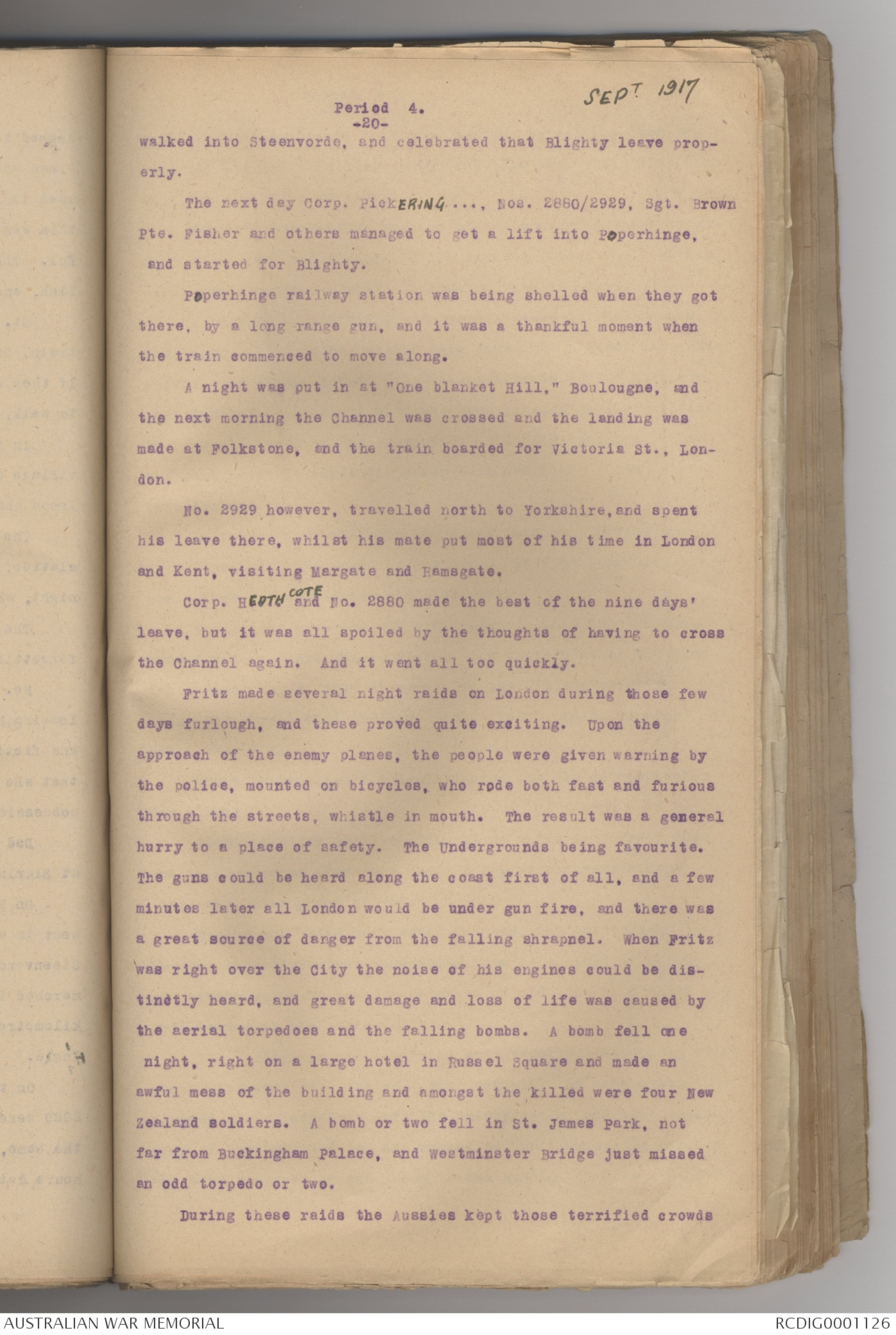
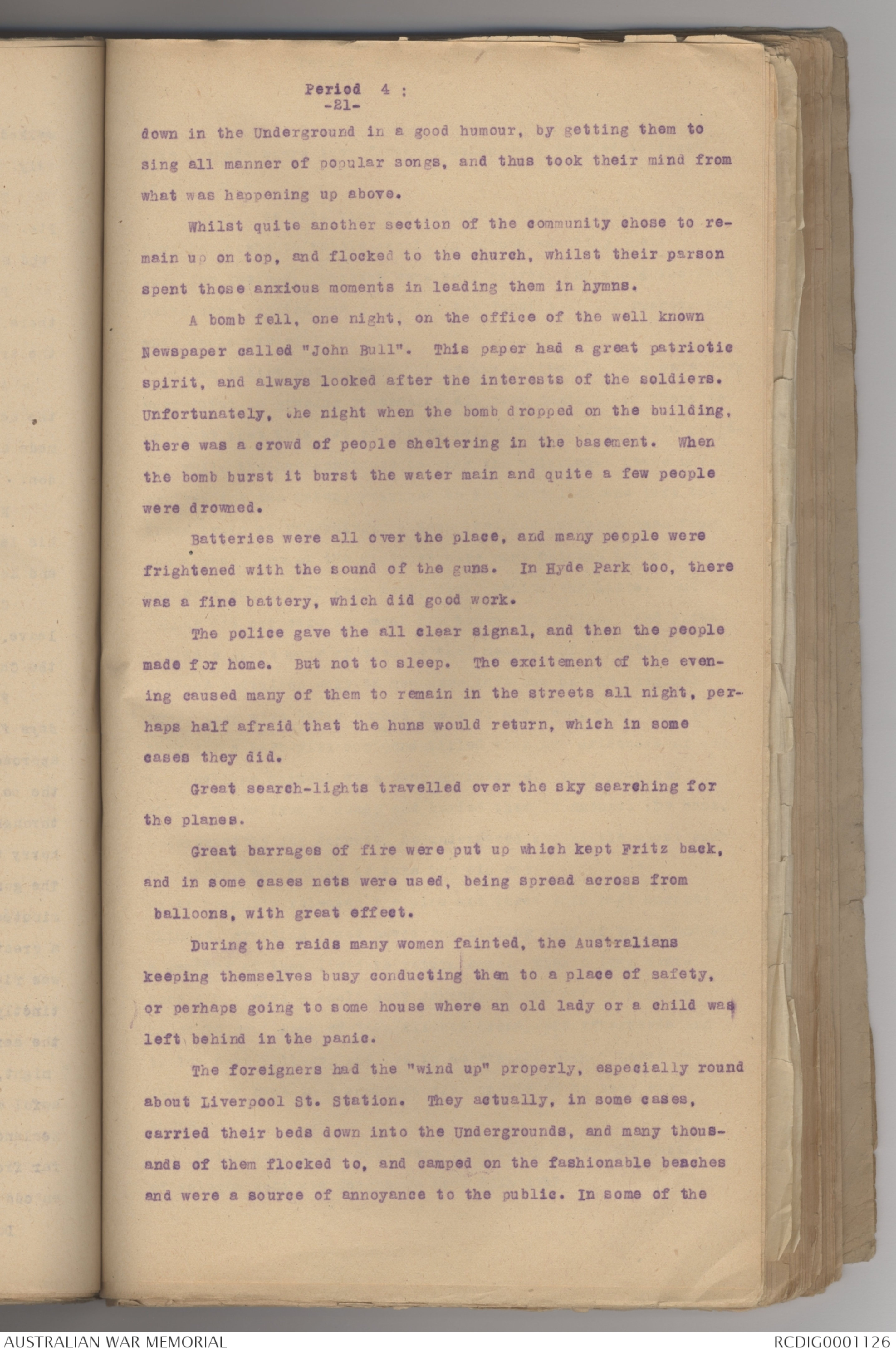
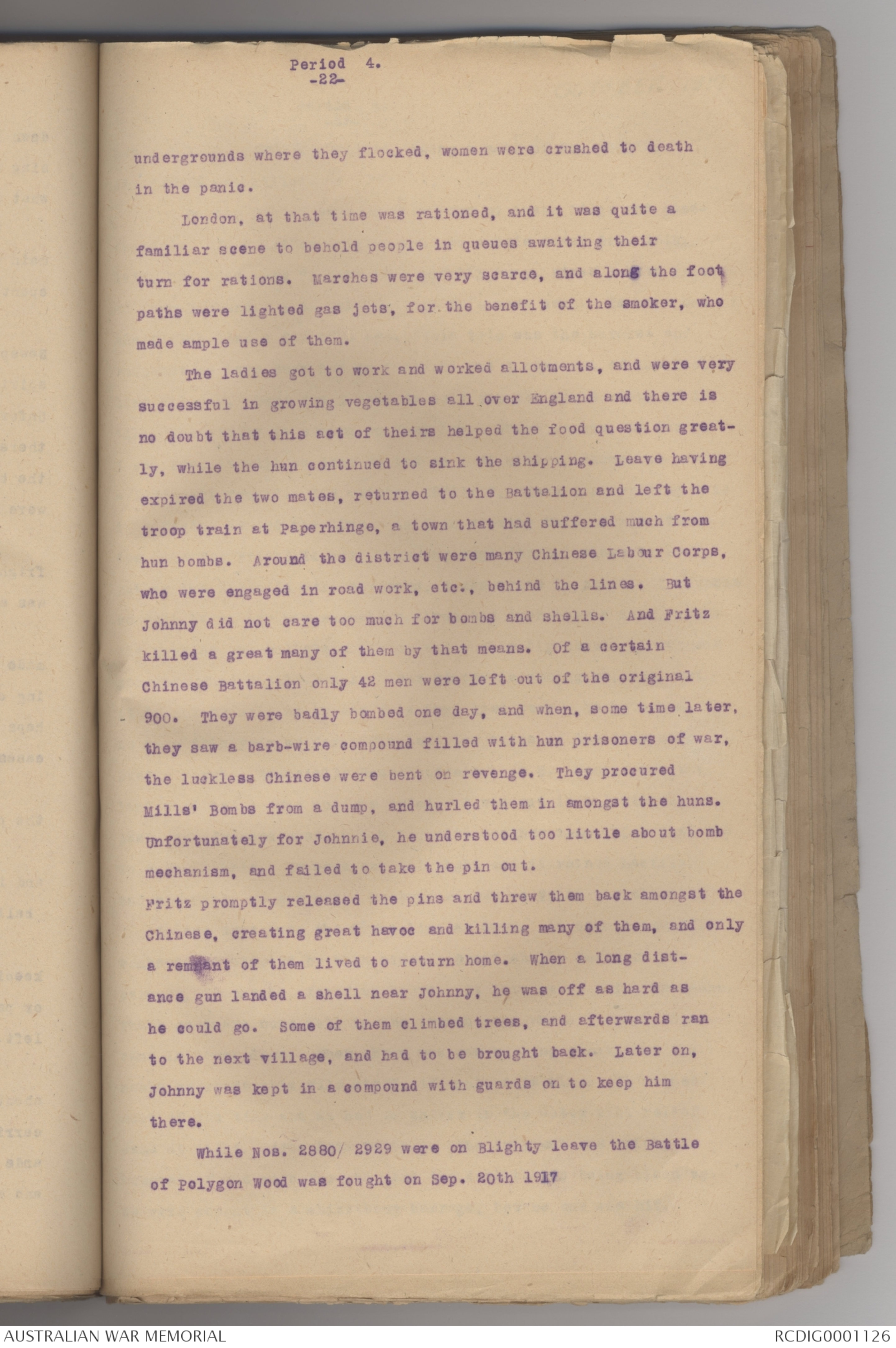
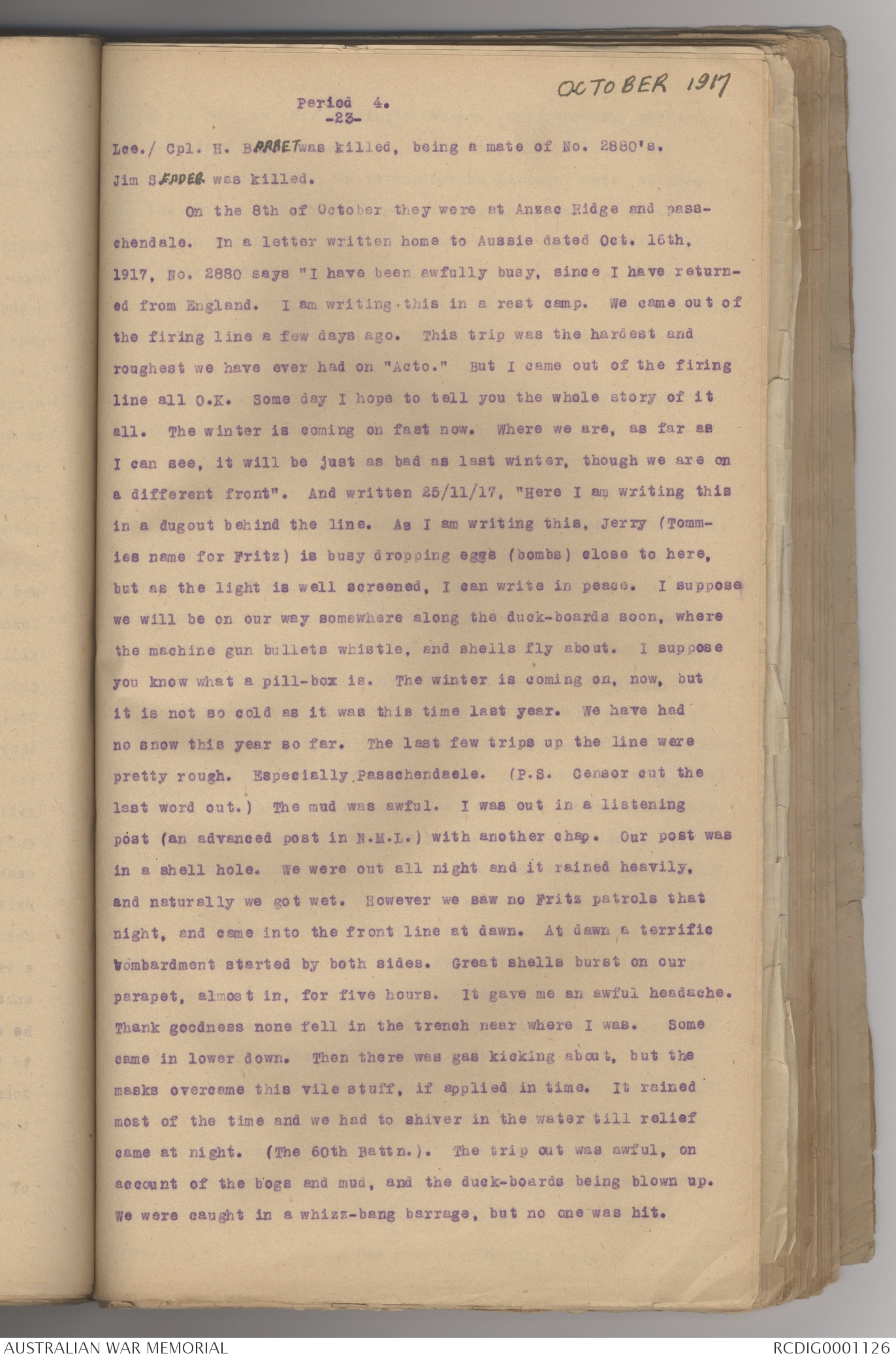
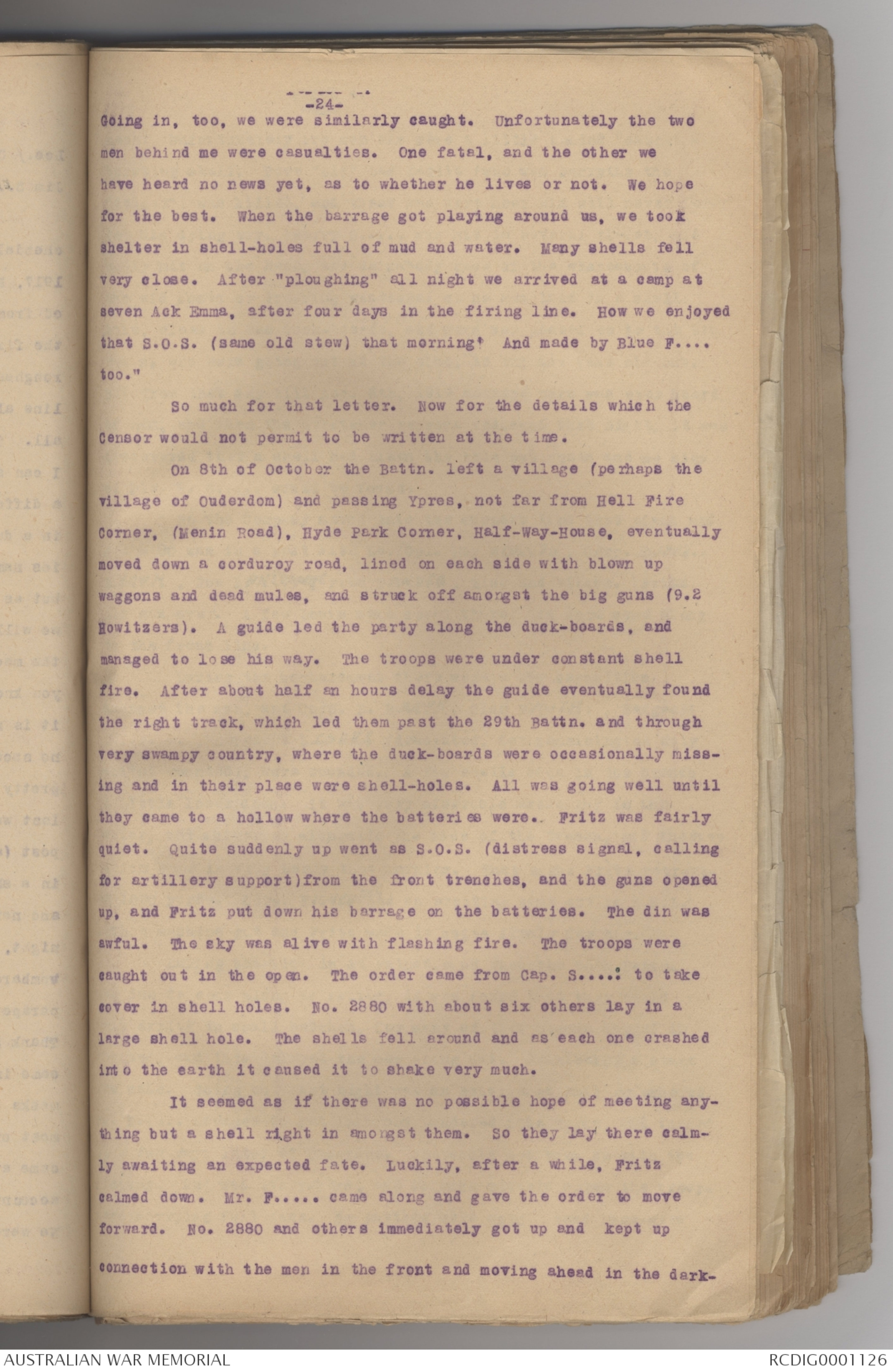
Period 4.
-15-
troughs, even in the dead of winter in other places.
The Anzac Coves were in the village, and thus some good
amusement was provided for the troops, as it was quite a good
show and for the outlay of half-a-franc, and suffering a great
cloud of tobacco smoke, one could get a fairly good entertainment.
Sometimes a lot of French folk would come along, especially
the garcons (boy). The next village along, was Boozincourt
where the church had a large cellar underneath it.
The Church at Senlis was nothing to look at from the outside,
but the interior was truly beautiful. Along the walls
were numerous oil-paintings and the altar looked grand. The
figures of Joan of Arc and others compared very favourably with
those figures in Madam Tussauds Wax Works, in London, and seemed
to only require the breath of life to make them human.
Here and there appeared the usual large crucifixes along
the road. Large wooden affairs, they were, but one saw them all
over France.
Some fatigue parties were carried out, and a few of the
old trenches were filled in. A little later on this village
came under shell fire in the big Hun advance.
During a practice with the rifle-grenades, one morning,
a grenade burst prematurely and unfortunately Mr....... was
hit and lost an eye. He was a popular officer and was returned
to Australia.
Nos. 2880/2929 received leave and went to Amiens for a
day. No. 2929 went on 21/6/17, and his mate, a few days later.
Amiens was a large and gay City, and called Little Paris. It
is famous for its great Cathedral, which was well sand-bagged
as a protection from bombs. It was quite a flourishing City.
The hun advance party reached there in 1914. The hun had done
a great deal of destruction from bombs along the railway line and
the town of Hazebrouck also suffered badly. Like other large
places Amiens had its water-ways and canals. The boats being
hauled along from the shore by horse-power. Before the war the
population was 30,000, and it was famous for its velvet.
JULY 1917.
Period 4. Page 16.
M. Jules Verne, the author lived there.
It was very noticeable how the people buying in the shops
used to handle the food, and in villages round about, the butcher
used to hang the meat out over the foot-path. Amiens is situated
on the banks of the River Somme and was quite an industrial
centre, with a fair tram service. It was quite a bright
city, and judging from the style of the place and the gay clothes
worn, one imagined a little what Paris must be.
Anzac House lay close to the Cathedral, the latter building
towering above the city like the great monument it was.
An important and interesting event took place on July
10th, being in the form of an inspection by the King at Henecourt.
Along the road from Senlis to Henecourt was a beautiful wood with
avenues through it. France is noted for its forestry, and it
is said that for every tree that is cut from these forests, another
is planted. The woods abound with game and some of the chaps
got into trouble for shooting the deer.
July 19th was the anniversary of the Fleur Baux stunt,
and all the men who were in that horrible affair had a kind of
reunion that day.
There was a large Chateaux at Senlis. All the villages
of any importance at all, boasted of a Chateaux, a kind of
large castle, generally having a moat and draw-bridge. Many
of them had an interesting history, if one only knew. Naturally
the Chateau was Brigade Headquarters, where the band used to
play of an evening.
Senlis was left behind very early in the morning of 30th
July, and the troops entrained for St. Omer, not far from the
Belgian Border. Then followed a nine kilometre march to Blaringham,
where a stay was made for a few really enjoyable weeks
in the barn of a jolly good French farm house, and the people
treated the men tip-top and they appreciated it greatly. The
old barn was very comfortable and clean, and Madam was a young
woman whose husband was a prisoner of war. She lived with her
old mother, and besides a young working girl, there were two
boys there. She had cows and pigs and dogs, and the whole place
Period 4.
-17-
was fairly comfortable. Madam never complained or put in a
bill when the boys "pinched" the fruit or walnuts, or even invaded
her potato field. She had a little estaminet over at the
house, and the boys used to assemble there of an evening. Those
dogs were in Luck's way, for she used to bake her own bread and
they always got their share of it, and milk too, whilst the old
pet cows were hand fed with large slices of bread. At this time
the troops were getting hard biscuits. A loaf or two could be
brought from Madam, and at the bottom end of the town, near the
canal was a bakery, where bread could be bought on the sly, as it
as against the law to sell troops, bread.
The parade ground was in Madam's paddock. Many long and
weary route marches came on the bill whilst there, full pack being
carried. Later on, that kind of thing was cut out. Men were
marehed till they nearly dropped, and how the back used to ache
with the pack: There is a story told of an officer, who marched
his men all day, and then called a halt. The next order was that
all those men who had had enough to take one pace forward. All the
en, save one, did so. Ah! said the officer, "I am glad to see
that you are a good soldier. You can march on further." "No!
Sir," he replied, "I am too tired to take the step forward."
Some of the "shrewd-heads" filled their packs with straw and
Pte. Clem SMITH.. actually had an air pillow blown up in his, having
the sides squared off with light pieces of wood. He would
travel light otherwise too.
These route marches generally led out to the Portuguese
area, and one day the boys marched 18Kilometres before dinner, in
order that they might march past a Portuguese General. Now, this
was no joke.
Training was carried out with reference to the capture of
hun pill-boxes, and on marching home from one of these stunts No.
2880 went along for seven days pack-drill, for talking in the ranks.
An inspection came off by Sir Douglas Haig, and was very
satisfactory. This ceremony took place at Racqueenham(?) in the
Portuguese area. Later on at Armentieres the "Aussie" sentry, one
Period 4.
-18-
night discovered a naked man approaching his post, and it
turned out to be a Portuguese soldier having a card from Fritz
around his neck, on which was written "not worth feeding."
At the same time as No. 2880 got the seven days pack-drill
Andy McGILVRAY. (a "Babbler") received the same issue for
getting leave on false pretences. Andy said he was going
across to Scotland to get married, but the wedding never came
off.
St. Omer was a famous place for Fritz's bombing machine of
a night, and it was a grand sight of a night to watch the
searchlights and the shells bursting, while the explosion of the
bombs could be distinctly heard above all the rest. A bomb
fell on the road near Company headquarters, but this happened
a little while before the troops billeted there. The farming
people were greatly terrified on account of the night bombing
machines, which in most cases could be distinguished from the
Allies' planes, owing to the peculiar hum of the engine.
One morning a bosche plane appeared over the barn, but was
up a great height, apparently upon an observation tour, as it
appeared almost the size of a large bird, and when Madam discovered
it, she had all the doors and windows closed, thus
imagining that the place would not be seen.
Everybody, who was there remembers the fight in the barn
by candle-light, and on the parade next morning what Major
C HEESEMAN had to say about "WALTERS" who had two large lips
just like a Murray cod, and BISSET how had two lovely black
eyes, while Jack LIDBURY. who caused all the damage had a
sprained wrist. They all had had a little too much wine,
especially "Biss", who could see huns with spiked helmets on,
coming from the corners of the barn.
While at Blaringham those pigs of Madams used to come in
the barn and cause damage, and so when one of them came in; one
morning, it went out squealing, for Pte. Clem SMITH had given
it a long point with the bayonet.
The French usually had supper at eight of an evening. This
SEO. 1917
Period 4.
-19-
seemed to always consist of potatoes and beans and coffee, plus
bread and butter. Madam, who kept an estaminet up on the hill
used to invite Corp. HEATHCOTE and No. 2880 often to supper, and
this was very acceptable, for the rations were none too plentiful.
They amused themselves, trying to learn the family English,
and to a little extent were successful.
St. Omer lay about 9 kilometres off and was connected by
train, but the troops were not allowed to travel on the trains.
If they were lucky to get leave there, then they either had
to walk, or get there the best way they could.
In the opposite direction was the village of Ayr. The
village Church was very neat. The white ceiling, the hanging
lamps and the stained windows were noticeable.
The streets were of the usual cobble stones, and the
clatter, clatter of the wooden boots sounded quite ghostly of a
night, when the roads were thick with ice.
The district was abundant in churches and chapels, not -
forgetting the crucifixes.
No. 16 platoon occupied a billet not far away, and upon
leaving,Madam put in a rather large bill for damages, both real
and fictitious. This was not paid however, as it was discovered
that she had quite a lot of army property and provisions in her
possession.
Dad Easlie and Billy WATTERS went on leave to Blighty whilst
at Blaringham.
On Sept. 17th the Company left Blzringham. "A" company
went in advance to Belgium to lay cables. The men marched to
Steenvorde, a town almost on the border, and the next day they
marched in Belgium and billeted in tents, about four or five
kilometres from Steenvorde, and not a great distance from Poperhinge.
On the 19th of September, word came along that Nos. 2880/
2929 were to proceed to the U.K. on leaves, and to celebrate
the same, Corp. Roy WORMAN, Corp. Herb Barrett (killed a few
hours later at Polygon Wood.), Pte. MERTON and No. 2880
SEPT 19
Period 4.
-20-
walked into Steenvorde, and celebrated that Blighty leave properly.
The next day Corp. PickERING..., Nos. 2880/2929. Sgt. Brown
Pte. Fisher and others månaged to get a lift into Poperhinge,
and started for Blighty.
Poperhinge railway station was being shelled when they got
there, by a long range gun, and it was a thankful moment when
the train commenced to move along.
A night was put in at "One blanket Hill," Boulougne, and
the next morning the Channel was crossed and the landing was
made at Folkstone, and the train boarded for Victoria St., London.
No. 2929 however, travelled north to Yorkshire, and spent
his leave there, whilst his mate put most of his time in London
and Kent, visiting Margate and Ramsgate.
Corp. HEATHCOTE and no. 2880 made the best of the nine days'
leave, but it was all spoiled by the thoughts of having to cross
the Channel again. And it went all too quickly.
Fritz made several night raids on London during those few
days furlough, and these proved quite exciting. Upon the
approach of the enemy planes, the people were given warning by
the police, mounted on bicycles, who rode both fast and furious
through the streets, whistle in mouth. The result was a general
hurry to a place of safety. The Undergrounds being favourite.
The guns could be heard along the coast first of all, and a few
minutes later all London would be under gun fire, and there was
a great source of danger from the falling shrapnel. When Fritz
was right over the City the noise of his engines could be distinctly
heard, and great damage and loss of life was caused by
the aerial torpedoes and the falling bombs. A bomb fell one
night, right on a large hotel in Russel Square and made an
awful mess of the building and amongst the killed were four New
Zealand soldiers. A bomb or two fell in St. James Park, not
far from Buckingham Palace, and Westminster Bridge just missed
an odd torpedo or two.
During these raids the Aussies kept those terrified crowds
Period 4 :
-21-
down in the Underground in a good humour, by getting them to
sing all manner of popular songs, and thus took their mind from
what was happening up above.
Whilst quite another section of the community chose to remain
up on top, and flocked to the church, whilst their parson
spent those anxious moments in leading them in hymns.
A bomb fell, one night, on the office of the well known
Newspaper called "John Bull". This paper had a great patriotic
spirit, and always looked after the interests of the soldiers.
Unfortunately, the night when the bomb dropped on the building,
there was a crowd of people sheltering in the basement. When
the bomb burst it burst the water main and quite a few people
were drowned.
Batteries were all over the place, and many people were
frightened with the sound of the guns. In Hyde Park too, there
was a fine battery, which did good work.
The police gave the all clear signal, and then the people
made for home. But not to sleep. The excitement of the evening
caused many of them to remain in the streets all night, perhaps
half afraid that the huns would return, which in some
cases they did.
Great search-lights travelled over the sky searching for
the planes.
Great barrages of fire were put up which kept Fritz back,
and in some cases nets were used, being spread across from
balloons, with great effeet.
During the raids many women fainted, the Australians
keeping themselves busy conducting them to a place of safety,
or perhaps going to some house where an old lady or a child was
left behind in the panic.
The foreigners had the "wind up" properly, especially round
about Liverpool St. Station. They actually, in some cases,
carried their beds down into the Undergrounds, and many thousands
of them flocked to, and camped on the fashionable beaches
and were a source of annoyance to the public. In some of the
Period 4.
-22-
undergrounds where they flocked, women were crushed to death
in the panic.
London, at that time was rationed, and it was quite a
familiar scene to behold people in queues awaiting their
turn for rations. Marches were very scarce, and along the foot
paths were lighted gas jets, for the benefit of the smoker, who
made ample use of them.
The ladies got to work and worked allotments, and were very
successful in growing vegetables all over England and there is
no doubt that this act of theirs helped the food question greatly,
while the hun continued to sink the shipping. Leave having
expired the two mates, returned to the Battalion and left the
troop train at Paperhinge, a town that had suffered much from
hun bombs. Around the district were many Chinese Labour Corps,
who were engaged in road work, etc, behind the lines. But
Johnny did not care too much for bombs and shells. And Fritz
killed a great many of them by that means. Of a certain
Chinese Battalion only 42 men were left out of the original
900. They were badly bombed one day, and when, some time later,
they saw a barb-wire compound filled with hun prisoners of war,
the luckless Chinese were bent on revenge. They procured
Mills' Bombs from a dump, and hurled them in amongst the huns.
Unfortunately for Johnnie, he understood too little about bomb
mechanism, and failed to take the pin out.
Fritz promptly released the pins and threw them back amongst the
Chinese, creating great havoc and killing many of them, and only
a remnant of them lived to return home. When a long distance
gun landed a shell near Johnny, he was off as hard as
he could go. Some of them climbed trees, and afterwards ran
to the next village, and had to be brought back. Later on,
Johnny was kept in a compound with guards on to keep him
there.
While Nos. 2880/ 2929 were on Blighty leave the Battle
of Polygon Wood was fought on Sep. 20th 1917
OCTOBER 1917
Period 4.
-23-
Lce./ Cpl. H. BARRET was killed, being a mate of No. 2880's.
Jim SEADER was killed.
On the 8th of October they were at Anzac Ridge and passchendale.
In a letter written home to Aussie dated Oct. 16th,
1917, No. 2880 says "I have been awfully busy, since I have returned
from England. I am writing this in a rest camp. We came out of
the firing line a few days ago. This trip was the hardest and
roughest we have ever had on "Acto." But I came out of the firing
line all O.K. Some day I hope to tell you the whole story of it
all. The winter is coming on fast now. Where we are, as far as
I can see, it will be just as bad as last winter, though we are on
a different front". And written 25/11/17, "Here I am writing this
in a dugout behind the line. As I am writing this, Jerry (Tommies
name for Fritz) is busy dropping eggs (bombs) close to here.
but as the light is well screened, I can write in peace. I suppose
we will be on our way somewhere along the duck-boards soon, where
the machine gun bullets whistle, and shells fly about. I suppose
you know what a pill-box is. The winter is coming on, now, but
it is not so cold as it was this time last year. We have had
no snow this year so far. The last few trips up the line were
pretty rough. Especially Passchendaele. (P.S. Censor cut the
last word out.) The mud was awful. I was out in a listening
post (an advanced post in N.M.L.) with another chap. Our post was
in a shell hole. We were out all night and it rained heavily,
and naturally we got wet. However we saw no Fritz patrols that
night, and came into the front line at dawn. At dawn a terrific
bombardment started by both sides. Great shells burst on our
parapet, almost in, for five hours. It gave me an awful headache.
Thank goodness none fell in the trench near where I was. Some
came in lower down. Then there was gas kicking abcut, but the
masks overcame this vile stuff, if applied in time. It rained
most of the time and we had to shiver in the water till relief
came at night. (The 60th Battn.). The trip out was awful, on
account of the bogs and mud, and the duck-boards being blown up.
We were caught in a whizz-bang barrage, but no one was hit.
-24-
Going in, too, we were similarly caught. Unfortunately the two
men behind me were casualties. One fatal, and the other we
have heard no news yet, as to whether he lives or not. We hope
for the best. When the barrage got playing around us, we took
shelter in shell-holes full of mud and water. Many shells fell
very close. After "ploughing" all night we arrived at a camp at
seven Ack Emma, after four days in the firing line. How we enjoyed
that S.O.S. (same old stew) that morning' And made by Blue F....
too."
So much for that letter. Now for the details which the
Censor would not permit to be written at the time.
On 8th of October the Battn. left a village (perhaps the
village of Ouderdom) and passing Ypres, not far from Hell Fire
Corner, (Menin Road), Hyde Park Corner, Half-Way-House, eventually
moved down a corduroy road, lined on each side with blown up
waggons and dead mules, and struck off amongst the big guns (9.2
Howitzers). A guide led the party along the duck-boards, and
managed to lose his way. The troops were under constant shell
fire. After about half an hours delay the guide eventually found
the right track, which led them past the 29th Battn. and through
very swampy country, where the duck-boards were occasionally missing
and in their place were shell-holes. All was going well until
they came to a hollow where the batteries were. Fritz was fairly
quiet. Quite suddenly up went as S.O.S. (distress signal, calling
for artillery support) from the front trenches, and the guns opened
up, and Fritz put down his barrage on the batteries. The din was
awful. The sky was alive with flashing fire. The troops were
caught out in the open. The order came from Cap. S....: to take
cover in shell holes. No. 2880 with about six others lay in a
large shell hole. The shells fell around and as each one crashed
into the earth it caused it to shake very much.
It seemed as if there was no possible hope of meeting anything
but a shell right in amongst them. So they lay there calmly
awaiting an expected fate. Luckily, after a while, Fritz
calmed down. Mr. F..... came along and gave the order to move
forward. No. 2880 and others immediately got up and kept up
connection with the men in the front and moving ahead in the dark-
 Kate Benn
Kate BennThis transcription item is now locked to you for editing. To release the lock either Save your changes or Cancel.
This lock will be automatically released after 60 minutes of inactivity.